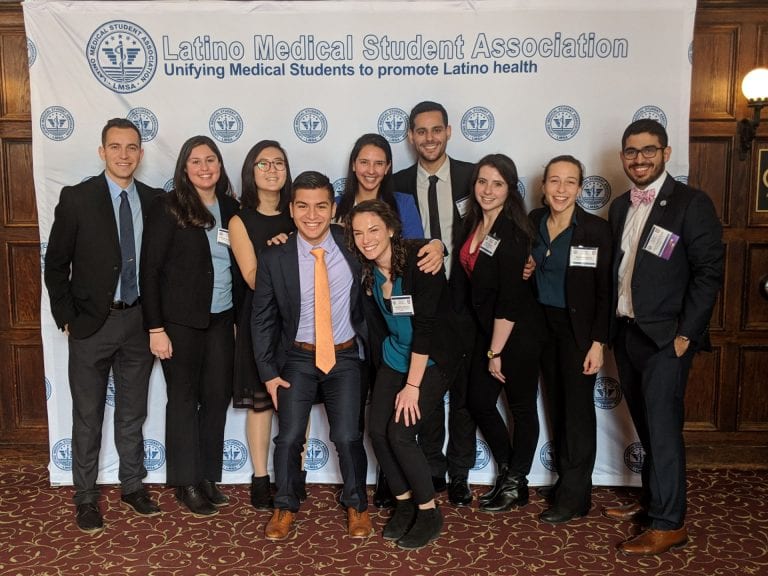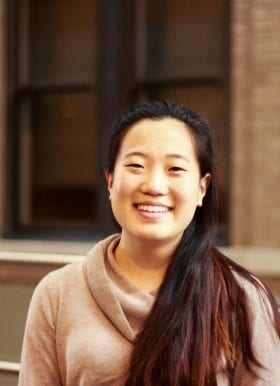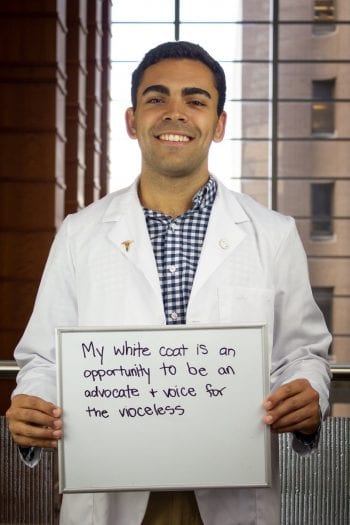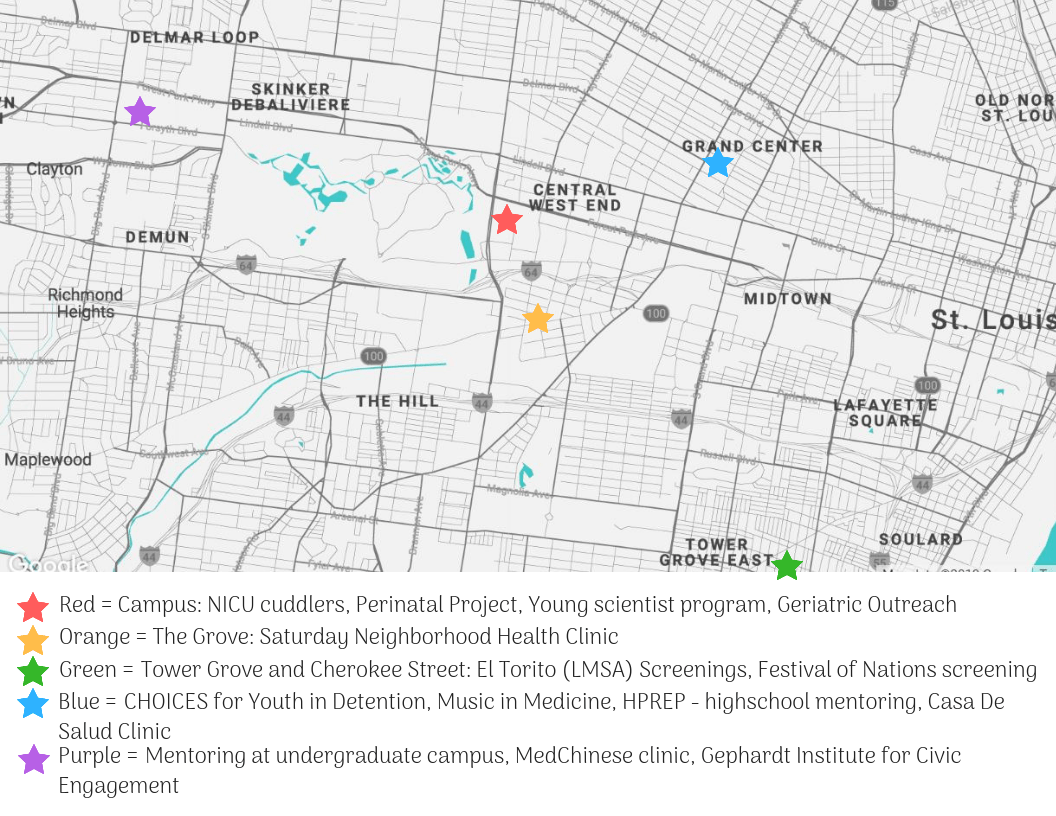Service is a mindset here at WUSM. It’s in the personal missions that we have given ourselves, as evidenced by phrases like “doing the smallest good” or “serving others with empathy or humility,” in response to our “What My White Coat Means to Me” event. It’s built into the framework of the curriculum through programs such as WUMP and selectives, where students spend afternoons and weekends in high schools and student-run clinics. Service, as a value and an act, is also present in the ways our classmates fill in when other classmates are sick, or in the baked goods we share in the carrel kitchen. Despite the variety of reasons why people choose WashU, there’s a sense of care here that is shared among all. (Monica L., M1)
Where We’re Involved
Asian Pacific American Medical Student Association (APAMSA)
John D., M1
The WashU chapter of the Asian Pacific American Medical Student Association (APAMSA) is focused on offering opportunities to advance health advocacy for Asian and Pacific American populations. WUSM APAMSA, in conjunction with the St. Louis University School of Medicine APAMSA, regularly hosts health screenings targeting Asian and Pacific American populations. Students get to learn and practice skills such as taking vital signs, taking a history and physical, measuring blood glucose, and conducting vision screenings. APAMSA also has a selective for learning medical Chinese, and hosts multiple events that celebrate Asian Pacific culture, such as Diwali and Lunar New Year Festival. Getting involved in volunteering with APAMSA is a fantastic way to not only practice your basic medical skills but also gain a greater awareness of many of the issues faced by the Asian and Pacific American community.
CHOICES
Olivia R., M1
WUMP, our orientation, focused on the dramatic health disparities in St. Louis and the history that contributed to them. At the end of those two weeks, many of us wanted to get involved in addressing those disparities on various levels, from high-level policy advocacy to volunteering in affected communities. I joined CHOICES (Choosing Healthy Options in our Community, Environment, and Schools), a program focused on empowering incarcerated youths to make healthy decisions. Incarceration and many of the life circumstances these kids have endured have been disempowering, so we use a case-based, interactive, conversational approach to addressing health choices. With small groups at the youth detention center, we cover topics such as navigating the health care systems and healthy relationships. They are always curious and excited to have us come, and we have some fun and fascinating conversations in which we all end up learning from each other! They get a chance to ask questions and discuss in a safe space, which often teaches us about the life factors and cultural beliefs that affect their health choices.
NICU Cuddlers
Momo O., M1
As a NICU cuddler, I spend several hours each month at St. Louis Children’s Hospital’s neonatal intensive care unit (NICU), cuddling babies who are upset, as well as interacting with babies who are awake and ready to play. NICU parents cannot always be by their baby’s side, and the nurses, who are often busy with other responsibilities, cannot always hold upset babies. As part of the NICU team, NICU Cuddlers’ goal is to minimize the amount of negative experiences a baby has during their NICU stay. As a student interested in neonatology, I have enjoyed learning more about the NICU environment while having the unique privilege of interacting with NICU babies. On top of that, I’ve found that cuddling babies is an excellent way to de-stress after a hard week of classes!
Washington University Medical Plunge (WUMP)
Washington University Medical Plunge, more affectionately known as “WUMP,” was the primary reason I chose to come to WashU. This is not your average medical school orientation. In these first two weeks, you will not only be introduced to the curriculum and classrooms where you will earn the degree “MD,” but, more importantly, you will learn about the people for whom you will care, and the history and continued struggles of the place you will come to call home. The experience of WUMP gives rich context to the rest of your medical journey, and it was everything I had hoped it would be.
Some of the activities and topics that you can expect:
- A boots-on-the-ground tour of health disparities in St. Louis
- Discussions on how birthplace and residential zip codes define health and life
- An incredible day with Professor Bob Hansman, who will share stories and lived experiences of young black teenagers that will demonstrate the importance of trauma-informed care in the physician’s role
- Learning about the history of mistrust of medicine and the factors that have and will contribute to perpetuating it
- Advocacy initiatives addressing critical public health issues, such as gun violence and access to health care
WUMP demonstrates that WashU aims to train physicians that are more than great clinicians and scientists. WashU trains physicians that see their patients as more than their diagnosis, who advocate and act for health equity in the communities where they practice. This is a reflection of the physician that I want to be, and I could not think of a better place to begin my training. (Hannah T., M1)
Given my prior involvement with community engagement (classes on health care disparities, volunteering in the local community, and service projects in underserved areas), WUMP was still refreshing enough to blow me away. It’s particularly powerful because the messages delivered are raw, personal, and real. You hear stories from local community members and notice problems that are quite frankly difficult to take in — but this forces you to open your eyes to what’s going on in the city you’ll call home for the next 4+ years.
Most importantly, WUMP calls on you to make a difference. Of course, there are limitations you need to accept and work within, and WUMP teaches you to recognize that. However, our students, often energized, driven, and well-supported, do put themselves out there, whether by joining one of the many awesome service organizations or even trying to start their own initiative (which our class did with their MedVan project (see below)).
WUMP is jarring but also inspiring, and it shows you that you can start to make connections, expose yourself to problems, and join efforts to bring about sustained change. (Ashwin L., M1)
I really care about my city, having lived in St. Louis my whole life. It is a city that many grow to care about after spending even a few months here. So, I appreciated that WUSM spends so much time introducing every incoming class to the city, helping them learn about its unique history and the unique challenges that came with it. What I didn’t realize was how much I myself would learn during WUMP! In the span of only one week, we learned more about racial disparity and segregation, local public health policy, and the lasting effects of racism in medicine than I got in my entire upbringing here. It was a lot of information to take in and sometimes seemed overwhelming, but it was amazing to see how invested the entire class became in my city and in beginning to do their part in addressing these disparities. In the end, WUMP did a great job of teaching students who are just setting foot in St. Louis for the first time how to have humility when working with different people and cultures, and it was honestly one of my favorite experiences so far as a first-year! (Thomas V., M1)
Health Professions Recruitment and Exposure Program (HPREP)
Nadia B., M1
As a volunteer for Health Professions Recruitment and Exposure Program (HPREP), I’ve had the opportunity to work with high school kids in an engaging and interactive way. We work with local high schools and the Juvenile Detention Center (JDC) to set up individually-themed teaching sessions throughout the year. During my first session at the JDC, I was able to talk to the kids about lung pathophysiology as a result of asthma and cigarette use. We also engaged in fun activities together to reinforce abstract concepts. As one of the coordinators for HPREP, I’m currently involved in planning the annual field trip. We organize a day for high school students to visit WUSM and learn skills like suturing and interpretation of radiological scans at a basic level. It’s a great way to engage with the community and foster these kids’ love for STEM. I’ve had an amazing time volunteering with them, and I’m hopeful that organizations like HPREP can have even a small impact on the way that kids view science and medicine.
Health Career Academy
Chris N., M1
Health Career Academy is an amazing selective. Yes, it counts as a credit for your first year! This is a mentorship opportunity where you visit a high school in North St. Louis and build mentoring and teaching relationships with students who may be from underserved backgrounds. For the first two sessions, you will help guide high schoolers on two case studies on patients who might present to an ER. This is a great way to talk about common medical diseases and treatments! Then, you help guide the students on a 4-session project that will involve creating a presentation about a health topic that affects their community. They will give these presentations to doctors at the medical school! Definitely consider taking this if you 1) enjoy teaching 2) love people 3) like fun.
Geriatric Outreach Group
Adrienne V., M1
I came to WashU after majoring in neuroscience and working in an Alzheimer’s research lab for my two gap years. As such, I knew a lot about the molecular mechanisms of neurodegeneration but not as much about the personal and interpersonal ramifications that accompany a dementia diagnosis. The Dementia Understanding Opportunity (DUO), run by the Geriatrics Outreach Group, is a longitudinal program that pairs WashU M1s with members of the St. Louis community who have recently been diagnosed with early-stage Alzheimer’s disease. They serve as our mentors as we talk about the lived experience of dementia. We meet with our mentors monthly for coffee, lunch, a shared hobby, or an excursion to a museum or another St. Louis attraction. I even participated in my mentor’s Improv for Memory Loss class!
The student participants also attend lunch seminars with renowned experts who speak with us about Alzheimer’s and dementia from biological, clinical, and ethical/legal perspectives. As one of the rare opportunities to develop a longitudinal interpersonal relationship with members of the patient population served by WUSM and Barnes-Jewish Hospital, the DUO program provides a space for my mentor and her husband to let me into their world of navigating a new diagnosis and coping with change. It’s also an opportunity to challenge misconceptions that you may have about Alzheimer’s disease and to learn about tenacity and contentment from older (and wiser) adults.

Saturday Neighborhood Health Clinic (SNHC)
Monica L., M1
The Saturday Neighborhood Health Clinic (SNHC) is the free primary care clinic run by WUSM students on Saturdays. Students oversee the entire operation, from the clinical encounter to public relations to patient referrals to specialty care clinics. During my first time at the SNHC, I was overwhelmed by all the components that go into providing quality care for a patient. You really have to consider how interactions you have with the patient affect their relationship with the health care system — and how that relationship will change their health outcomes. If you’re interested in learning more about the safety net of health care and various barriers to health care access, such as transportation, cost, and language, you will have the opportunity to learn here while seeing patients, writing notes, and presenting to volunteer physicians.
Med Van
Samantha K., M1
A couple of weeks after WUMP wrapped up, Dr. Will Ross, the Associate Dean for Diversity, met with our class to brainstorm how we as medical students could begin to help address the injustices we had learned about during WUMP. The idea that generated the most excitement from our class was the possibility of developing a mobile prenatal clinic. The infant and maternal mortality rates in some predominantly African American St. Louis zip codes are comparable to those in developing countries, and transportation is a significant barrier to women living in those neighborhoods from getting adequate prenatal care.
With the enthusiastic support of Dr. Ross, a group of us began meeting with community members and organizations who are already working on reducing infant and maternal mortality disparities. We learned more about their work and received feedback about our idea. We very quickly realized that launching a mobile prenatal clinic would take many months to accomplish, and while we are still pursuing that project, we also wanted to do something more immediately. We decided that founding a student group would be the best way to enable medical students to learn more about maternal/child health in St. Louis and actively engage in work already being done to reduce mortality disparities. We’re not an official group quite yet, but we’re hoping to organize lunch/dinner talks, advocate for policies that will improve the health of St. Louis moms and babies, connect students with volunteering opportunities at local organizations, and hold events like diaper drives. We are also developing a selective for next year focusing on maternal/child health in St. Louis. Keep an eye out for us at the activities fair next year, and please consider registering for our selective! We’d love to have you!
Navajo Nation Service Trip
Monica L., M1
The annual M1 trip to the Navajo Nation builds on a long-standing relationship with the community there and introduces first-year medical students to health care providers at the Northern Navajo Medical Center. Like many activities at WUSM, mentorship is a focus — and trip participants always love getting to spend time with students on the reservation, sharing their experiences while learning more about the Navajo culture and history. Besides the days you spend indoor camping and traveling with community health representatives, you also spend 18 hours in a car together with other M1s and visit national parks near the community.

Schnucks Health Screenings
Alanna W., M1
Schnucks Health Screenings are an amazing way to get involved in the community your first year! We go into local Schnucks grocery stores and provide free blood pressure and blood sugar screenings. It’s a really amazing and super fun experience, as it’s a chance for us to learn more about the community and the people we’re serving in St. Louis. The people tend to be interested in hearing about their health and the (little) advice we can offer them. It’s a great way to practice your clinical skills, but more importantly practice talking to patients!

Latino Medical Student Association (LMSA)
Alex Z., M1
Our Latino Medical Student Association (LMSA) is a chapter of the national organization that aims to represent, support, educate, and unify Latino/a medical students. Whether you’re Latino/a yourself or are interested in health advocacy for this population, there are lots of opportunities to get involved. We have regular health screenings at the El Torito supermarket and health fairs/festivals, as well as opportunities to mentor underrepresented students and interviewees. If you’d like to practice your Spanish or celebrate Latin culture, we have lunch gatherings with Spanish-speaking faculty and social events like going to the Greater St. Louis Hispanic Festival and celebrating Las Posadas. We also help organize the Medical Spanish selective and are involved in the regional and national LMSA conferences. It’s a really fun and welcoming community!
Sun Protection Outreaching Teaching by Students (SPOTS)
Dana S., M1
Sun Protection Outreaching Teaching by Students (SPOTS) is a great way to get involved in educating the community about skin cancer. There are two training sessions in which you learn about identifying different types of skin cancers, risk factors, treatments, and prevention. After the trainings, you have the opportunity to teach adolescents in middle school about skin cancer and the importance of sun protection. SPOTS can be taken as a selective or done as an extra volunteer activity. Either way, it is a good opportunity to spread awareness about skin cancer and effective methods of sun protection to teens in the community.
Section Editor

Monica Lim
Section Editor & Photographer
I grew up in Piney Woods of East Texas and made my way to Washington University to study biology and urban studies. I loved being here so much that I decided to renew my lease. Ask me about living in St. Louis, running in Forest Park, taking photos, or finding time for reading in med school.
















